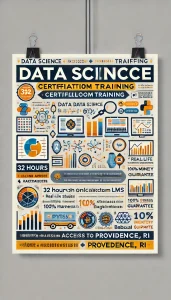- Start date: 27th August 9:00am EDT
- End date: 27th August 17:00pm EDT
About this event
Data Science refers to the process of extracting valuable information from various structured or unstructured data, e.g., data mining. Data Science aims to explore, sort, and analyze metadata from a variety of sources and use them to draw conclusions, optimize business processes, and support decision-making. Our industry experts have developed the Data Science Certification to help individuals know how Data Science works and how it plays an important role in Artificial Intelligence (AI).
Data Science course accelerates your career in Data Science and provides you with the world-class training and skills required to become successful in this field. The course offers extensive training on the most in-demand Data Science and Machine Learning skills with hands-on exposure to key tools and technologies including Python, R, Tableau, and concepts of Machine Learning. Become a Data Scientist by diving deep into the nuances of data interpretation, mastering technologies like Machine Learning, and mastering powerful programming skills to take your career in Data Science to the next level.
This training session will help the learners become successful Data Scientists and improve their ability to analyze business data to extract meaningful insights.
Key Features:
- 32 hours of online Classroom training
- Real-life case studies
- Lifetime access to Learning Management System (LMS)
- Practical Assignments
- 100% Money Back Guarantee
- 24/7 customer support
Why Data Science?
- Businesses Will Need One Million Data Scientists by 2023 – KDnuggets
- Roles like chief data & chief analytics officers have emerged to ensure that analytical insights drive business strategies – Forbes
- The average salary for a Data Scientist is $113k (Glassdoor)
Course Agenda:
Introduction to Data Science
Goal – Get an introduction to Data Science in this Module and see how Data Science helps to analyze large and unstructured data with different tools.
Objectives – At the end of this Module, you should be able to:
- Define Data Science
- Discuss the era of Data Science
- Describe the Role of a Data Scientist
- Illustrate the Life cycle of Data Science
- List the Tools used in Data Science
- State what role Big Data and Hadoop, R, Spark, and Machine Learning play in Data Science
Topics:
- What is Data Science?
- What does Data Science involve?
- Era of Data Science
- Business Intelligence vs Data Science
- Life cycle of Data Science
- Tools of Data Science
- Introduction to Big Data and Hadoop
- Introduction to R
- Introduction to Spark
- Introduction to Machine Learning
Statistical Inference
Goal – In this Module, you should learn about different statistical techniques and terminologies used in data analysis.
Objectives – At the end of this Module, you should be able to:
- Define Statistical Inference
- List the Terminologies of Statistics
- Illustrate the measures of the Centre and Spread
- Explain the concept of Probability
- State Probability Distributions
Topics:
- What is Statistical Inference?
- Terminologies of Statistics
- Measures of Centers
- Measures of Spread
- Probability
- Normal Distribution
- Binary Distribution
Data Extraction, Wrangling, and Exploration
Goal – Discuss the different sources available to extract data, arrange the data in a structured form, analyze the data, and represent the data in a graphical format.
Objectives – At the end of this Module, you should be able to:
- Discuss Data Acquisition techniques
- List the different types of Data
- Evaluate Input Data
- Explain the Data Wrangling techniques
- Discuss Data Exploration
Topics:
- Data Analysis Pipeline
- What is Data Extraction
- Types of Data
- Raw and Processed Data
- Data Wrangling
- Exploratory Data Analysis
- Visualization of Data
Hands-On/Demo:
- Loading different types of the dataset in R
- Arranging the data
- Plotting the graphs
Introduction to Machine Learning
Goal – Get an introduction to Machine Learning as part of this Module. You will discuss the various categories of Machine Learning and implement Supervised Learning Algorithms.
Objectives – At the end of this module, you should be able to:
- Define Machine Learning
- Discuss Machine Learning Use cases
- List the categories of Machine Learning
- Illustrate Supervised Learning Algorithms
This is an excerpt from ‘Eventbrite’. To continue reading, click here.


